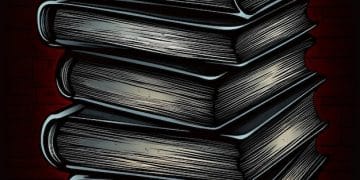Key Debates in US Literary Criticism: Canon & Appropriation

Contemporary US literary criticism faces key debates regarding the canon and cultural appropriation, questioning traditional standards of literary excellence and ethical responsibilities in representation amid evolving cultural landscapes.
Contemporary literary criticism in the United States is a dynamic field grappling with questions of tradition, representation, and ethical responsibility. One of the most significant areas of contention revolves around the literary canon and cultural appropriation, both of which have come under intense scrutiny in recent decades.
The Evolving Literary Canon: Who Gets to Be Included?
The literary canon, traditionally defined as the body of works considered most important and influential within a culture, has long been a subject of debate. However, the late 20th and early 21st centuries have witnessed particularly intense challenges to the established canon in the US.
Challenging Traditional Standards
Historically, the literary canon in the United States, as in many Western nations, was largely composed of works by white, male, and European-descended authors. Critics argue that this limited representation fails to reflect the diverse experiences and perspectives that constitute American society.
The Rise of Multicultural Literature
Multicultural literature, encompassing works by authors from various racial, ethnic, and cultural backgrounds, has gained increasing prominence in literary studies. This shift reflects a broader societal movement towards inclusivity and a recognition of the value of diverse voices.
- Re-evaluation of historical figures neglected due to racial or gender bias.
- Emphasis on works exploring themes of identity, displacement, and marginalization.
- Recognition of the contributions of indigenous literatures and oral traditions.
Debates surrounding the canon often involve questions of aesthetic value versus social and political relevance. Is a work deemed “great” solely on formal or artistic grounds, or should its contribution to cultural understanding and social justice also be considered?

Cultural Appropriation: Ethical Boundaries in Literary Representation
Cultural appropriation, defined as the adoption or use of elements of a minority culture by members of the dominant culture, is another contentious issue in contemporary US literary criticism. The debate centers on the ethics of representation and the potential for harm when writers from dominant groups depict cultures to which they do not belong.
Authenticity and Representation
Critics of cultural appropriation argue that writers who borrow from other cultures often do so without a deep understanding of the cultural context or significance of the borrowed elements. This can lead to misrepresentation, distortion, and the perpetuation of harmful stereotypes.
Power Dynamics and Exploitation
Furthermore, cultural appropriation often occurs within a context of power imbalance, where the dominant culture profits from the creative work of marginalized groups without giving proper credit or compensation. This can be seen as a form of cultural exploitation.
The question of who has the right to tell a particular story is central to the debate over cultural appropriation. Some argue that writers should only write about their own experiences and cultural backgrounds to avoid perpetuating harmful representations.
Others argue that writers should be free to explore any subject matter, as long as they do so with sensitivity, respect, and a commitment to accuracy. This perspective emphasizes the importance of research, consultation with members of the culture being represented, and a critical awareness of one’s own positionality.
The Role of Identity in Literary Criticism
The rise of identity politics has had a profound impact on literary criticism in the US, leading to increased attention to the ways in which race, ethnicity, gender, sexuality, and other aspects of identity shape both the production and reception of literature.
Authorial Identity and Interpretation
Some critics argue that an author’s identity is essential to understanding their work. For example, a novel written by an African American author about the experience of racial discrimination may be interpreted differently than a similar novel written by a white author.
Reader Response and Interpretation
Reader-response theory emphasizes the role of the reader in constructing meaning. From this perspective, a reader’s own identity and experiences can shape their interpretation of a literary work.
- Increased awareness of the potential for bias in literary analysis.
- Emphasis on the importance of diverse critical perspectives.
- Exploration of the intersectionality of various aspects of identity.
However, an overemphasis on identity can also lead to essentialism, the belief that all members of a particular group share the same experiences and perspectives. Critical approaches must be nuanced and avoid making generalizations about individuals based on their identity.

Postcolonialism and US Literary Studies
Postcolonial theory, which examines the legacy of colonialism and its impact on cultures around the world, has become increasingly influential in US literary studies. This perspective challenges traditional Western-centric views of literature and culture.
Examining Power Dynamics
Postcolonial critics analyze the ways in which literature can perpetuate or resist colonial ideologies. They examine the representation of marginalized cultures and voices and challenge the dominance of Western literary traditions.
Challenging Eurocentrism
Postcolonial theory encourages a broader understanding of literature that includes voices from the Global South and challenges the notion that Western literature is inherently superior.
The application of postcolonial theory to US literature involves examining the country’s own history of colonialism and imperialism, including the treatment of Native Americans and the legacy of slavery.
The Impact of Critical Race Theory
Critical Race Theory (CRT), initially developed in legal studies, has significantly impacted literary criticism by providing a framework for analyzing the role of race and racism in literature and culture.
Deconstructing Racial Narratives
CRT examines how literature can perpetuate or challenge racial stereotypes and discriminatory practices. It focuses on the experiences of people of color and the ways in which systemic racism shapes their lives.
Intersectionality and Identity
CRT also emphasizes the concept of intersectionality, recognizing that race intersects with other aspects of identity, such as gender, class, and sexuality, to create unique experiences of oppression and privilege.
The application of CRT to literary studies involves analyzing the representation of race in literature, examining the role of white privilege, and challenging the notion of racial neutrality.
The Future of Literary Criticism: Bridging Divides
Contemporary US literary criticism faces the challenge of navigating these complex and often conflicting debates. Finding common ground and fostering productive dialogue is essential for advancing the field.
Promoting Inclusive Scholarship
Encouraging diverse voices and perspectives in literary scholarship is crucial for creating a more inclusive and representative field. This includes supporting scholars from marginalized backgrounds and promoting research that challenges traditional assumptions.
Emphasizing Ethical Responsibility
Literary critics have a responsibility to engage with literature in an ethical manner, being mindful of the potential for harm and striving to promote understanding and empathy.
- Developing new methodologies for analyzing literature in a culturally sensitive manner.
- Fostering interdisciplinary collaborations between literary scholars and other experts.
- Creating opportunities for dialogue and debate across different critical perspectives.
Ultimately, the goal of literary criticism should be to enhance our understanding of literature and its relationship to society, while promoting social justice and inclusivity. The debates surrounding the canon and cultural appropriation are essential for achieving this goal.
| Key Concept | Brief Description |
|---|---|
| 📚 Evolving Canon | Debates on expanding the literary canon to include diverse voices and perspectives. |
| 🎭 Cultural Appropriation | Ethical concerns about borrowing from minority cultures without understanding or respect. |
| ✊ Identity Politics | The role of race, gender, and sexuality in interpreting and creating literature. |
| 🌍 Postcolonialism | Analysis of literature’s role in perpetuating or resisting colonial ideologies. |
Frequently Asked Questions
▼
The literary canon refers to a collection of works deemed the most important and influential in a particular culture, shaping literary standards and values. It is constantly evolving due to ongoing critical reevaluations.
▼
Cultural appropriation raises ethical questions on how different cultures are represented and whether power dynamics and potential exploitation get fair acknowledgment in literature.
▼
Identity politics introduces perspectives related to race, gender and more, leading to questions about the ways personal identities shape the creation and interpretation of literary texts.
▼
Postcolonial theory examines colonial legacies and cultural impacts in literature, challenging Eurocentric views and amplifying the value and literary contributions of marginalized cultures.
▼
Critical Race Theory (CRT) analyzes how race and racism influence literature. It seeks to identify and understand the various ways in which literature may promote damaging stereotypes and discriminatory patterns.
Conclusion
The key debates in contemporary US literary criticism surrounding the canon and cultural appropriation reflect a broader cultural shift towards inclusivity, social justice, and ethical responsibility. By engaging with these debates in a thoughtful and critical manner, literary scholars can contribute to a more nuanced and equitable understanding of literature and its relationship to society.





